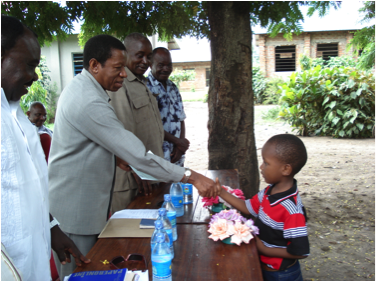Spearheading Universal Birth Registration for Tanzanian Children
Ninety-seven percent of Tanzanian children who live outside urban communities are unrecognized by their state government. Because children have not received birth certificates, they are not legally registered and that makes access to essential services difficult in the best scenario and impossible in others. “Unregistered children are, almost inevitably, the children of the poor and excluded,” says Shamsi Mhina, the Organizational Advisor of the Tujikomboe Group, a community-based organization in Tanzania’s Kilosa District. “Lack of registration exacerbates their poverty and underscores their marginalization. While birth registration does not of itself guarantee education, health, protection, and participation; its absence can put these fundamental rights beyond the reach of those already on the margins of society.”
Tujikomboe has now launched a universal birth registration campaign to register all local children. The roots of this campaign began in 2004, when Tujikomboe was formed by seven concerned citizens who saw the hardships caused by HIV, AIDS, and poverty and decided to address them. As staff trained community members in HIV and AIDS prevention, they saw growing numbers of orphans without birth certificates.
Children were left destitute because they were unable to access critical services such as educational assistance and healthcare. Adding to their lack of rights, without written wills from caregivers some children were unable to claim their parent’s property. Tujikomboe staff conducted a survey of community residents and found that more than 75 percent of children in the area lacked birth certificates. They quickly started to train community members on birth registration and helping parents to write wills.
By educating locals and leaders in churches and schools, and community gatherings, Tujikomboe is able to sensitize some of the most rural communities in Tanzania to these problems. Working with the Kilosa Death and Birth Registrar, they set up mobile birth registration sites in local villages. The government has since seen their success, copied the model, and now uses mobile registration methods in urban areas throughout the country.
Initially, Tujikomboe planned to register 800 children in one year—400 in each of two wards. In the first ward, Malolo, they registered 483 children, 20 percent more than they had originally anticipated. But in Mikumi ward, they only succeeded in registering 58 children, 15 percent of their goal. Puzzled by the low participation in Mikumi, Tujikomboe staff visited 21 households to ask questions. They found that parents and guardians understood the importance of registration and were willing to do it, but lacked the money to pay the registration fee. Most caregivers are low-paid laborers with an average of 3 to 5 children in the household. With this information, Tujikomboe initiated the free, universal birth registration campaign for Tanzania.
Tujikomboe employs an approach that fosters collective, sustained participation. Using awareness-raising, community mobilization, and advocacy activities, they work to ensure children's access to preschool and primary education, strengthen agricultural extension services, help vulnerable adults access small loans for microenterprises, and create an informal, youth-friendly HIV and AIDS information center. With Firelight's support, Tujikomboe expects to register a minimum of 750 children (the first step in obtaining a birth certificate) or provide them with a birth certificate this year.

